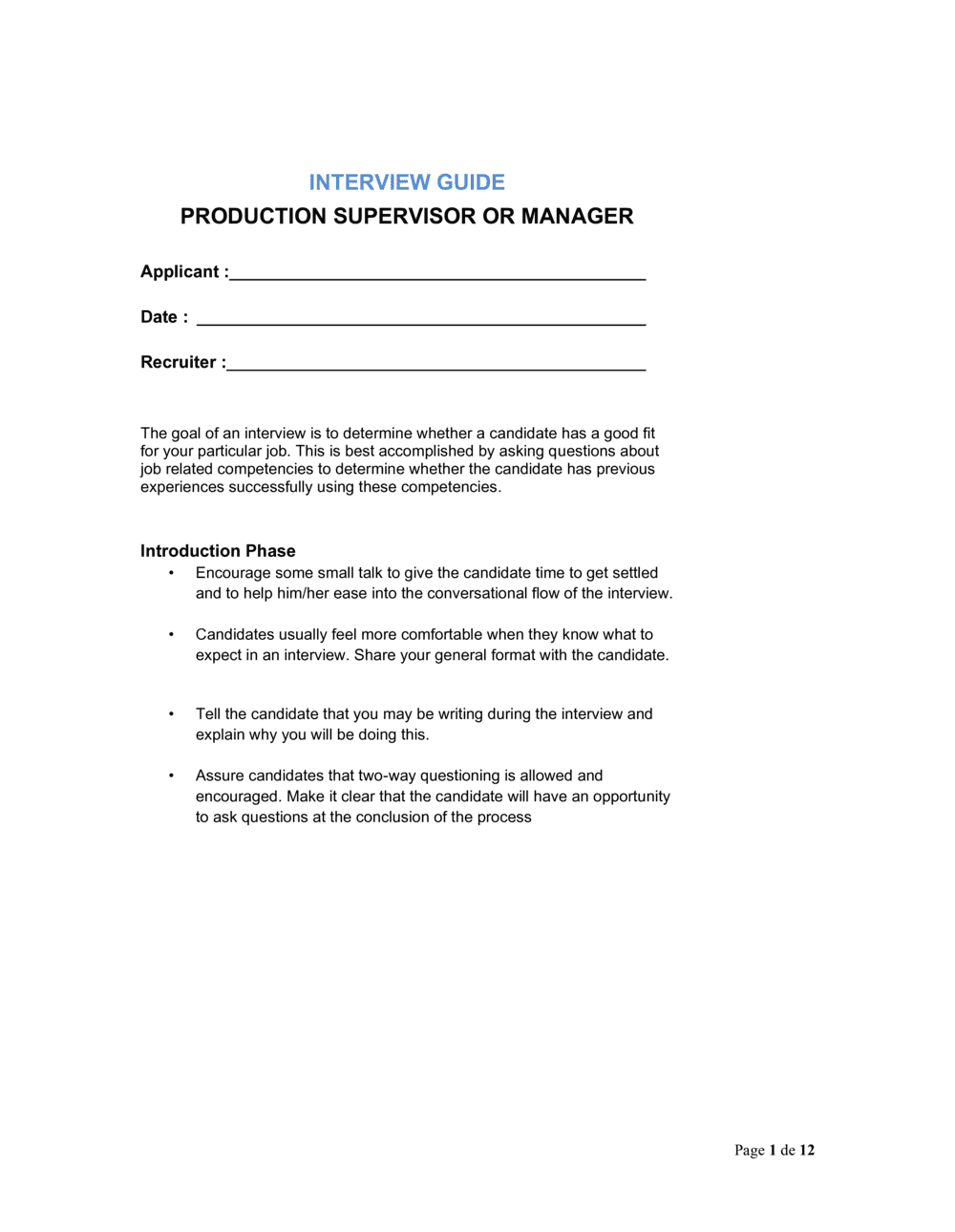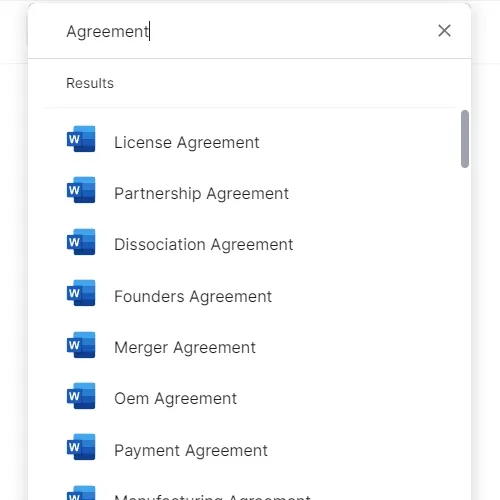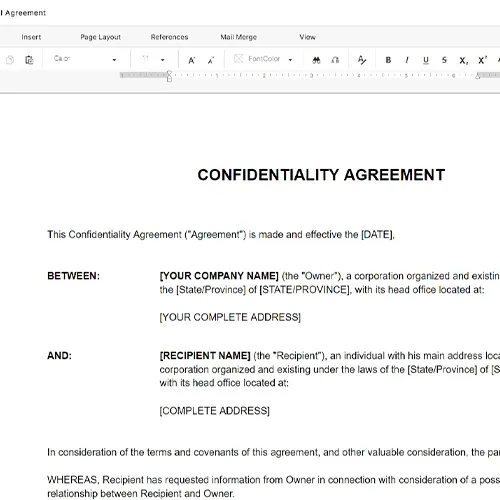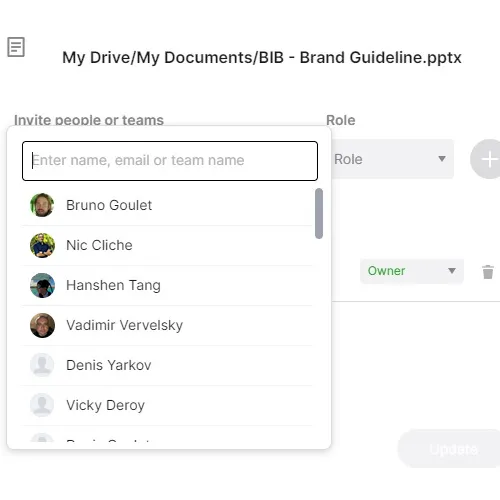Interview Guide Production Supervisor or Manager

Document content
This interview guide production supervisor or manager template has 12 pages and is a MS Word file type listed under our human resources documents.
Sample of our interview guide production supervisor or manager template:
INTERVIEW GUIDE PRODUCTION SUPERVISOR OR MANAGER Applicant : Date : Recruiter : The goal of an interview is to determine whether a candidate has a good fit for your particular job. This is best accomplished by asking questions about job related competencies to determine whether the candidate has previous experiences successfully using these competencies. Introduction Phase Encourage some small talk to give the candidate time to get settled and to help him/her ease into the conversational flow of the interview. Candidates usually feel more comfortable when they know what to expect in an interview. Share your general format with the candidate. Tell the candidate that you may be writing during the interview and explain why you will be doing this. Assure candidates that two-way questioning is allowed and encouraged. Make it clear that the candidate will have an opportunity to ask questions at the conclusion of the process Interview Phase Have your competency based questions ready for scoring. We recommend a 1 to 5 scoring grid; a score of 1 would mean the candidate has demonstrated no experience using the competency and a score of 5 indicating the candidate has a deep understanding of the competency and has used it successfully in the past with good results. Probing: After asking a planned question, you may want to probe for more information to support a candidate's response. Probes are usually unplanned; you use them when you want the candidate to clarify or expand upon a point or when you want more insight into his/her thoughts, feelings, and behaviours.("Please expand upon that." "Describe how you .") Clarifying Inconsistencies: When a candidate appears to be caught in a contradiction, it may be appropriate to bring the conflicting information to the surface for clarification. ("You mentioned earlier that you were involved in developing a distance education course. You are now indicating that you have limited experience with distance education and need to learn more about it. Please clarify your experience with distance education.") Paraphrasing: When in doubt that you have fully understood a candidate's response, restate what you think you heard in your own words and ask the candidate for feedback. ("You are basically stating that there are several ways to handle this situation depending upon the way in which the client presents the problem. Is that what you meant?") Silence or Pause: Silences or pauses are an effective technique for encouraging the candidate to do the talking. When there is a silence or pause, don't jump in with another question; allow the candidate time to reflect and form a response. Look expectantly at him or her while you wait. Repeating: When the candidate appears to be avoiding a question, come back to it again. While the candidate may have reasons for trying to evade it, she/he may simply have gotten sidetracked or may not fully understand what you mean. Leadership The position requires a willingness to lead, take charge, offer opinions and give direction. Successful leaders stand up for themselves, naturally take charge of groups or teams, and are very persuasive when they need to be. If leading a team is important, they will also be empathetic to subordinates, listen to their concerns, take time to question and understand their issues, diagnose developmental needs, and work together with them to develop improvement plans. Before you ask this question, best practice suggests that you know beforehand the degree of leadership associated with both satisfactory and unsatisfactory job performance. Some people are inclined to keep quiet while others are willing to make a public stand for what they believe. Give me some examples that illustrate what you do. 1 2 3 4 5 Minimal ability/NA Average ability Exceptional ability Comments Dependability Dependability involves the employee being reliable, on time, responsible, dependable, and consistently fulfilling commitments. On the job the employees must do what they say and say what they do. A dependable employee can be trusted to give straight answers, follow through, and complete assignments on time and within budget. Their behaviour is predictable and seldom holds any surprises or unexpected reactions. They can be counted on to be honest and upfront with co-workers regardless of the situation. Before you ask this question, best practice suggests that you know beforehand the kind of dependability associated with both satisfactory and unsatisfactory job performance. Give me at least three examples when other people had to depend on you to get something done. What were the events ? What did you do? What was the result ? 1 2 3 4 5 Minimal ability/NA Average ability Exceptional ability Comments Self Control The position requires maintaining composure, keeping emotions in check, controlling anger, and avoiding aggressive behaviour even in very difficult situations. People who have self-control seldom let their disappointment show and keep working even when exhausted. They demonstrate consistent performance from day to day regardless of how they feel and rarely lose their temper with colleagues, customers, clients or patients. Before you ask this question, best practice suggests that you know beforehand the degree of self-control associated with both satisfactory and unsatisfactory job performance. Some people are not easy to get along with. Please give me some examples where you had to deal with difficult people. What was the situation ? What did you do? What was the result ? 1 2 3 4 5 Minimal ability/NA Average ability Exceptional ability Comments Stress Tolerance The position requires the employee to accept criticism and deal calmly and effectively with high stress situations over which they have little control. It includes maintaining effectiveness regardless of what conditions arise. Stress tolerant people don't easily get their feelings hurt and are willing to accept criticism. Before you ask this question, best practice suggests that you know beforehand the degree of stress-tolerance associated with both satisfactory and unsatisfactory job performance. Sometimes things get stressful. Give me some examples of when you experienced high-stress situations you could do nothing to change. What were the situations ? What did you do? What was the result ? 1 2 3 4 5 Minimal ability/NA Average ability Exceptional ability Comments Attention to detail
3,000+ Templates & Tools to Help You Start, Run & Grow Your Business

Document content
This interview guide production supervisor or manager template has 12 pages and is a MS Word file type listed under our human resources documents.
Sample of our interview guide production supervisor or manager template:
INTERVIEW GUIDE PRODUCTION SUPERVISOR OR MANAGER Applicant : Date : Recruiter : The goal of an interview is to determine whether a candidate has a good fit for your particular job. This is best accomplished by asking questions about job related competencies to determine whether the candidate has previous experiences successfully using these competencies. Introduction Phase Encourage some small talk to give the candidate time to get settled and to help him/her ease into the conversational flow of the interview. Candidates usually feel more comfortable when they know what to expect in an interview. Share your general format with the candidate. Tell the candidate that you may be writing during the interview and explain why you will be doing this. Assure candidates that two-way questioning is allowed and encouraged. Make it clear that the candidate will have an opportunity to ask questions at the conclusion of the process Interview Phase Have your competency based questions ready for scoring. We recommend a 1 to 5 scoring grid; a score of 1 would mean the candidate has demonstrated no experience using the competency and a score of 5 indicating the candidate has a deep understanding of the competency and has used it successfully in the past with good results. Probing: After asking a planned question, you may want to probe for more information to support a candidate's response. Probes are usually unplanned; you use them when you want the candidate to clarify or expand upon a point or when you want more insight into his/her thoughts, feelings, and behaviours.("Please expand upon that." "Describe how you .") Clarifying Inconsistencies: When a candidate appears to be caught in a contradiction, it may be appropriate to bring the conflicting information to the surface for clarification. ("You mentioned earlier that you were involved in developing a distance education course. You are now indicating that you have limited experience with distance education and need to learn more about it. Please clarify your experience with distance education.") Paraphrasing: When in doubt that you have fully understood a candidate's response, restate what you think you heard in your own words and ask the candidate for feedback. ("You are basically stating that there are several ways to handle this situation depending upon the way in which the client presents the problem. Is that what you meant?") Silence or Pause: Silences or pauses are an effective technique for encouraging the candidate to do the talking. When there is a silence or pause, don't jump in with another question; allow the candidate time to reflect and form a response. Look expectantly at him or her while you wait. Repeating: When the candidate appears to be avoiding a question, come back to it again. While the candidate may have reasons for trying to evade it, she/he may simply have gotten sidetracked or may not fully understand what you mean. Leadership The position requires a willingness to lead, take charge, offer opinions and give direction. Successful leaders stand up for themselves, naturally take charge of groups or teams, and are very persuasive when they need to be. If leading a team is important, they will also be empathetic to subordinates, listen to their concerns, take time to question and understand their issues, diagnose developmental needs, and work together with them to develop improvement plans. Before you ask this question, best practice suggests that you know beforehand the degree of leadership associated with both satisfactory and unsatisfactory job performance. Some people are inclined to keep quiet while others are willing to make a public stand for what they believe. Give me some examples that illustrate what you do. 1 2 3 4 5 Minimal ability/NA Average ability Exceptional ability Comments Dependability Dependability involves the employee being reliable, on time, responsible, dependable, and consistently fulfilling commitments. On the job the employees must do what they say and say what they do. A dependable employee can be trusted to give straight answers, follow through, and complete assignments on time and within budget. Their behaviour is predictable and seldom holds any surprises or unexpected reactions. They can be counted on to be honest and upfront with co-workers regardless of the situation. Before you ask this question, best practice suggests that you know beforehand the kind of dependability associated with both satisfactory and unsatisfactory job performance. Give me at least three examples when other people had to depend on you to get something done. What were the events ? What did you do? What was the result ? 1 2 3 4 5 Minimal ability/NA Average ability Exceptional ability Comments Self Control The position requires maintaining composure, keeping emotions in check, controlling anger, and avoiding aggressive behaviour even in very difficult situations. People who have self-control seldom let their disappointment show and keep working even when exhausted. They demonstrate consistent performance from day to day regardless of how they feel and rarely lose their temper with colleagues, customers, clients or patients. Before you ask this question, best practice suggests that you know beforehand the degree of self-control associated with both satisfactory and unsatisfactory job performance. Some people are not easy to get along with. Please give me some examples where you had to deal with difficult people. What was the situation ? What did you do? What was the result ? 1 2 3 4 5 Minimal ability/NA Average ability Exceptional ability Comments Stress Tolerance The position requires the employee to accept criticism and deal calmly and effectively with high stress situations over which they have little control. It includes maintaining effectiveness regardless of what conditions arise. Stress tolerant people don't easily get their feelings hurt and are willing to accept criticism. Before you ask this question, best practice suggests that you know beforehand the degree of stress-tolerance associated with both satisfactory and unsatisfactory job performance. Sometimes things get stressful. Give me some examples of when you experienced high-stress situations you could do nothing to change. What were the situations ? What did you do? What was the result ? 1 2 3 4 5 Minimal ability/NA Average ability Exceptional ability Comments Attention to detail
Easily Create Any Business Document You Need in Minutes.

Access over 3,000+ business and legal templates for any business task, project or initiative.

Customize your ready-made business document template and save it in the cloud.

Share your files and folders with your team. Create a space of seamless collaboration.
Templates and Tools to Manage Every Aspect of Your Business.
Business in a Box Covers Every Business Department
Includes 16 Types of Business Documents You Need
and Achieve Your Business Goals Faster.
